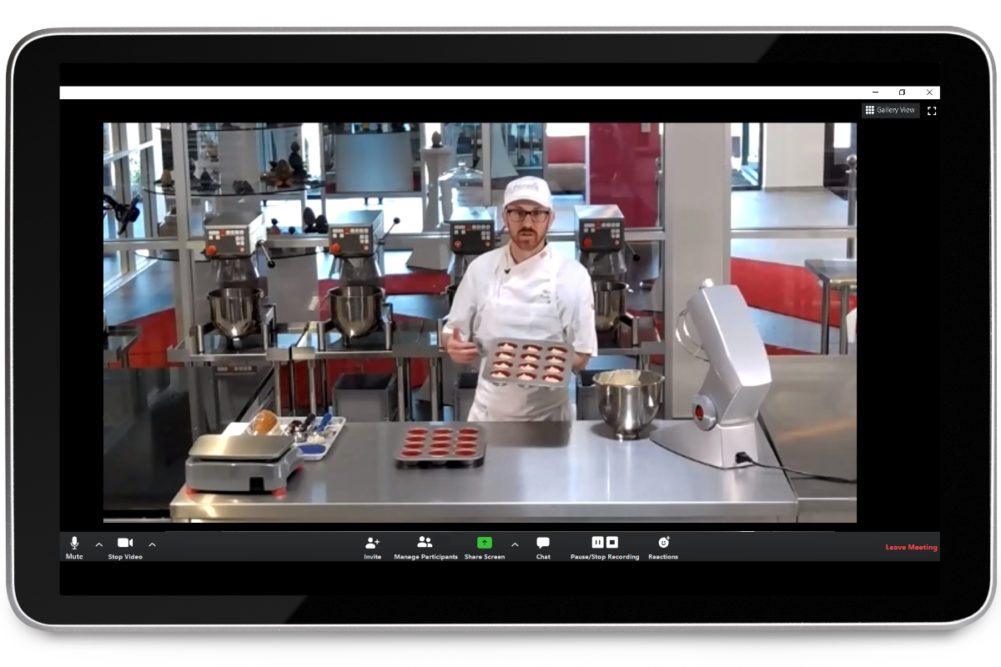PENNSAUKEN, NJ — Some bakers want to switch quickly to manufacturing retail items like pan bread since the coronavirus (COVID-19) pandemic has cut into their foodservice demand.
“To be able to move into those new businesses was obviously a significant challenge where people were calling us, and they were saying, ‘We need help really quickly,’” said Andy Brimacombe, president of Pennsauken-based Puratos US.
Puratos US has responded by offering two new programs. MyAdvantage, an online resource, focuses on ready-to-use products and offers information on adjusting recipes to accommodate the shift in consumer demand to packaged goods and online shopping. MyLink digital services give Puratos US customers resources for product support, including a direct technical support hotline and an online request for interactive technical support.
Executives of Puratos said some of the changes, including elements of the two new programs, brought on by the pandemic may last in the baking industry even after the crisis subsides. Mr. Brimacombe said COVID-19 has had little impact on the company’s workforce and its ability to meet orders.
Not all Puratos’ customers are ready to manufacture finished baked foods that they normally do not, said Guillame Bourneau, vice president of research and development for Puratos US.
“So we tried to put in place a very simple process here so that they can shift from crusty breads to long shelf-life breads,” he said. “So it’s not only the availability of the workforce. It’s the training of the workforce to (make) very quickly products that they are not used to doing.”
Puratos offers a full mix for pan bread that needs only oil and water, Mr. Brimacombe said.
Ingredient supply, especially for major ingredients like flour, sugar and fats, has not been a major problem, Mr. Bourneau said. A few problems exist with minor ingredients in the baking industry, but Puratos manufactures a lot of its own ingredients to avoid dependence on other supply chains, and the company increased its inventory of enzymes in February.
“It might happen here and there in the market that people might miss some very specific functionalities,” he said. “We are on the safe side here (at Puratos), but I think there are here and there some threats on the market. To this point there is enough flour, fat and sugar in the US in the coming weeks.”
Puratos facilities seeing less use amid COVID-19 are the company’s innovation centers. Customers normally visit the centers to renovate products or develop new products, Mr. Brimacombe said. Travel restrictions have halted that practice.
Still, MyLink digital services are keeping Puratos technicians in communication with customers. Mr. Bourneau said Puratos has more than 20 technical advisers available every day to take customer calls. The company is making use of digital video programs like Zoom as well. Puratos advisers want to see inside the baker’s facility without being physically next to the baker, he said.
“We want to make sure we see what they see: That we can give them immediate feedback, immediate recommendations,” Mr. Bourneau said.
Some Puratos’ innovations brought on by COVID-19 could last beyond the crisis, said Jaina Wald, head of US marketing. One revelation might be bakers finding a faster way to produce an item with one person instead of four or five people.
“You have to imagine that a couple years from now or a couple months from now as things start to change, some of those changes are going to stick, and they are going to continue, and the efficiencies that (bakers) sought out now, they will continue to execute because they found they could do more with less,” she said.
After the crisis, bakers who used MyAdvantage may question whether it is worthwhile to scale “lots and lots” of minor ingredients, Mr. Brimacombe said. The bakers instead might consider having a company such as Puratos provide concentrated solutions or full mixes.
“People are going to consider the balance of risk and reward in some of these scenarios,” he said.
After the crisis, bakers might diversify and supply different sectors, not relying too heavily on one sector, Mr. Bourneau said. Relying too much on the foodservice sector has been damaging during COVID-19.
“That is a revolution that is happening now, and I think it’s going to stay after the crisis, too,” he said.
Puratos as a company has weathered the COVID-19 pandemic so far.
“We’ve been very fortunate,” Mr. Brimacombe said. “We have a very robust business. We’ve been able to manage the mix across different channels.”
Puratos workers are practicing social distancing at facilities, he said. Workers that may perform their jobs outside the facilities are doing so. Investing in automation has kept down the number of workers in facilities.
“So we haven’t got huge numbers of people working in close proximity,” Mr. Brimacombe said.
Puratos has facilities in two states hit hard by the pandemic. Besides Pennsauken, the company runs a facility in Kent, Wash. Many COVID-19 cases were detected in north New Jersey, but Pennsauken is in south New Jersey, Mr. Brimacombe said.
“Obviously, the proximity to New York, that is a concern and something we’re monitoring very closely,” he said.





